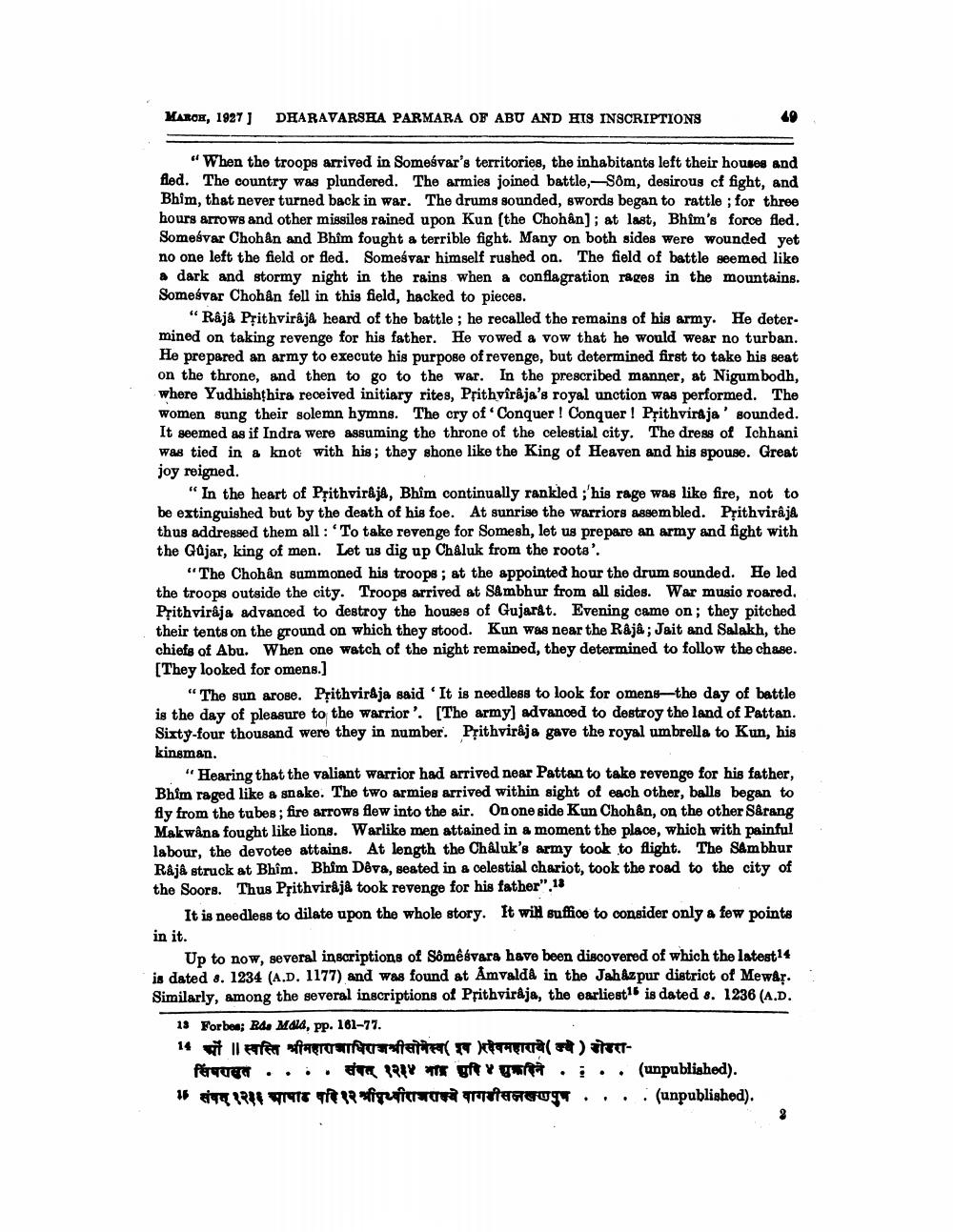________________
MAROE, 1927)
DHARAVARSHA PARMARA OF ABU AND HIS INSCRIPTIONS
40
"When the troops arrived in Someśvar's territories, the inhabitants left their houses and fled. The country was plundered. The armies joined battle,Sôm, desirous cf fight, and Bhim, that never turned back in war. The drums sounded, swords began to rattle ; for three hours arrows and other missiles rained upon Kun (the Chohan); at last, Bhim's force fled. Somesvar Chohan and Bhim fought a terrible fight. Many on both sides were wounded yet no one left the field or fled. Someśvar himself rushed on. The field of battle seemed like a dark and stormy night in the rains when a conflagration rages in the mountains. Somegvar Chohån fell in this field, hacked to pieces.
"Raja Prithviraja heard of the battle ; he recalled the remains of his army. He determined on taking revenge for his father. He vowed a vow that he would wear no turban. He prepared an army to execute his purpose of revenge, but determined first to take his seat on the throne, and then to go to the war. In the prescribed manner, at Nigum bodh, where Yudhishthira received initiary rites, Prithviraja's royal unction was performed. The women sung their solemn hymns. The cry of Conquer ! Conquer ! Prithviraja' sounded. It seemed as if Indra were assuming the throne of the celestial city. The dress of Ichhani was tied in a knot with his; they shone like the King of Heaven and his spouse. Great joy reigned.
"In the heart of Prithviraja, Bhim continually rankled ; his rage was like fire, not to be extinguished but by the death of his foe. At sunrise the warriors assembled. Prithviraja thus addressed them all : 'To take revenge for Somesh, let us prepare an army and fight with the Gujar, king of men. Let us dig up Chaluk from the roots'.
"The Chohân summoned his troops ; at the appointed hour the drum sounded. He led the troops outside the city. Troops arrived at Sambhur from all sides. War musio roared, Prithviraja advanced to destroy the houses of Gujarat. Evening came on; they pitched their tents on the ground on which they stood. Kun was near the R&jâ; Jait and Salakh, the chiefs of Abu. When one watch of the night remained, they determined to follow the chase. [They looked for omens.]
“The sun arose. Prithviraja said It is needless to look for omens-the day of battle is the day of pleasure to the warrior'. [The army] advanced to destroy the land of Pattan. Sixty-four thousand were they in number. Prithviraja gave the royal umbrella to Kun, his kingman.
"Hearing that the valiant warrior had arrived near Pattan to take revenge for his father, Bhim raged like a snake. The two armies arrived within sight of each other, balls began to fly from the tubes; fire arrows flew into the air. On one side Kun Choh&n, on the other Sarang Makwâna fought like lions. Warlike men attained in a moment the place, which with painful labour, the devotee attains. At length the Châluk's army took to flight. The Sambhur Rajâ struck at Bhim. Bhim Déva, seated in & celestial chariot, took the road to the city of the Soors. Thus Prithviraj& took revenge for his father".18
It is needless to dilate upon the whole story. It will suffice to consider only a few points in it.
Up to now, several inscriptions of Sômêsvara have been discovered of which the latest14 is dated s. 1234 (A.D. 1177) and was found at Amvalda in the Jah&zpur district of Mewar. Similarly, among the several inscriptions of Prithviraja, the earliest15 is dated 8. 1236 (A.D.
18 For bea; Rde Mald, pp. 161–77. 1" भो ॥ स्वस्ति श्रीमहाराजाधिराजश्रीसोनेस्वर श्व )रदेवमहारावे(ब) गेररा
férence ... TE 1948 TK ghy ywna.;.. (unpublished). 1 TIR TT f igura maternicuge...: (unpublished).




